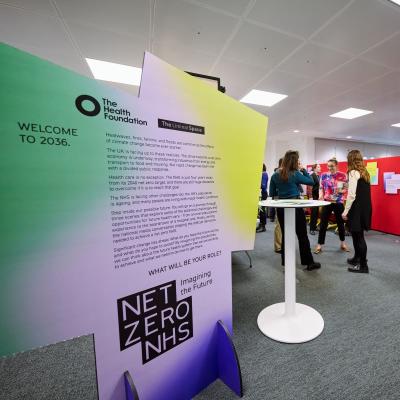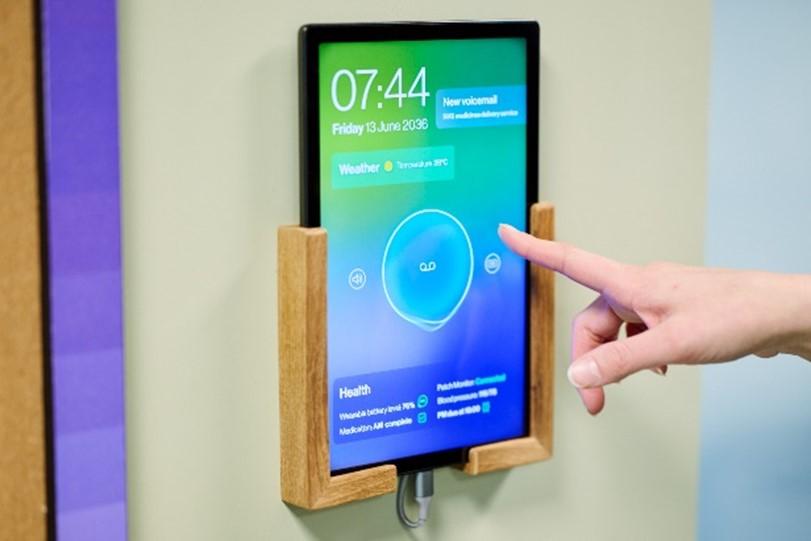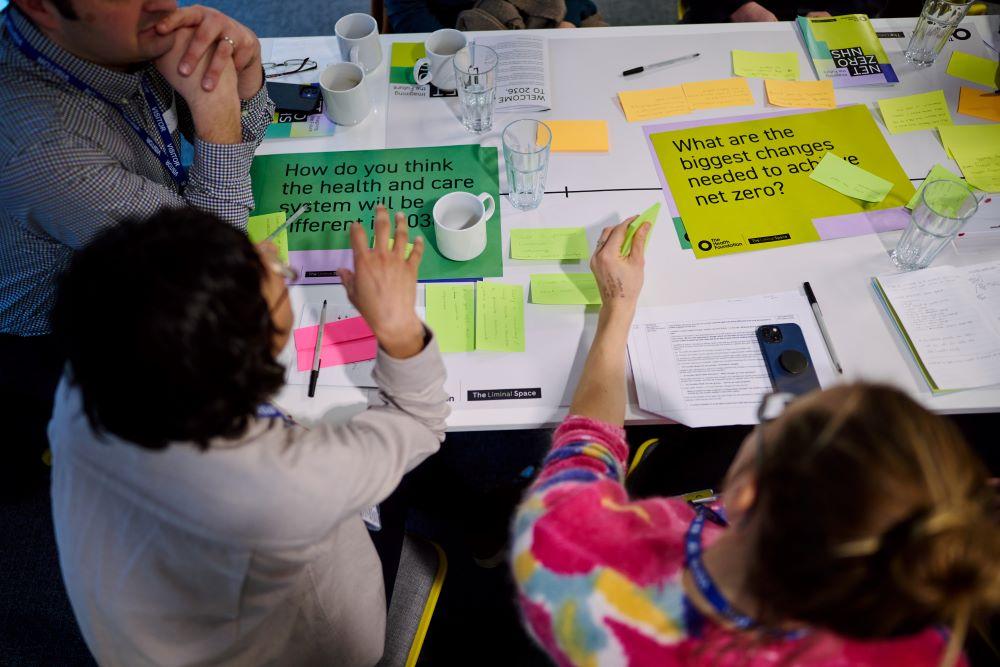One day in 2036 – imagining the net zero NHS of the future
26 February 2024

Transitioning to a net zero health system by 2040 is critical, but it certainly won’t be easy. It will require big changes to how care is delivered and experienced.
If you’ve visited the Health Foundation’s offices over the last few months you might have encountered our ‘Net zero NHS: imagining the future’ installation – a chance to experience what the NHS might look like in 2036 and to explore some of the opportunities, challenges and tensions the journey to a net zero NHS could create.
Net zero NHS, imagining the future
The immersive experience takes you through three different scenes, all set in a scenario of one day in the NHS in June 2036. That’s four years away from the NHS in England’s net zero target for its direct carbon emissions.
‘We've imagined a future NHS that's made good progress on reducing its carbon emissions, but still has some tough decisions to make and some obstacles to overcome to meet its 2040 goals’, says Genevieve Cameron from our policy team. Genevieve was involved in developing the installation, working with creative consultancy The Liminal Space.
One day in 2036
To experience the installation you walk through three rooms, each set up to show a scene at a different point in one day in 2036. Each scene explores some of the potential challenges and opportunities for future health care – from an everyday patient experience to the boardroom of a hospital and, finally, joining the national media conversation shaping the difficult decisions needed to achieve a net zero NHS.
‘The scenes are not meant to be our predictions of the future,’ says Genevieve. ‘They just help to create a personal experience that will spark people’s imagination and get them thinking about what we might want (or not want) a net zero NHS to look like. That helps people to think about what they personally can be doing now to help get there.’
Amanda Gore, Director at The Liminal Space, says they chose this creative approach because creating these kinds of tangible immersive experiences can be a very powerful way to build understanding of complex topics.
‘It's actually really hard to imagine what a net zero NHS might look like. We know that helping people to think in a holistic way is important. So by simulating this experience of being in 2036, we’re asking you not just to think about the NHS, but also about what else might be changed in your life, what the climate or the political environment might be like, how you might be using technology in new ways. What new things might feel normal.‘

Widening understanding and making connections
Climate change is one of the leading threats to global health. The NHS, which is responsible for around 4% of England’s total carbon footprint and 40% of public sector emissions, has an important role in mitigating as well as adapting to the impacts of climate change.
Genevieve says, ‘When people think about how to do that, they tend to think of making buildings more efficient, installing solar panels on roofs and using electric vehicles, but what is less talked about is that we actually need to change the whole shape of how health care is currently delivered and experienced by patients.
‘We wanted this work to help build that understanding of what’s really required to get to net zero, and how this is relevant to everyone who works in the NHS.’
Amanda agrees, ‘When you get people thinking more broadly, they understand how the journey to net zero affects everyone. People start talking about education for people working in the NHS, for example, embedding sustainable health care into student training. Or about funding. At the moment hospitals receive money for the number of procedures they do. Imagine a world where the money flowed differently. Where understanding how to cut carbon emissions was valued as much as understanding how to cut costs.’
One of the aims of the project is also to encourage people to make the link with wider changes that need to happen in society in order to achieve net zero for the NHS.
‘It's such a complex and interconnected issue’, says Genevieve. ‘Having this immersive experience helps people make connections and builds that understanding really quickly. For example, to reduce NHS emissions you need to reduce emissions from patient travel to appointments. But to do that you need a robust public transport infrastructure in place. It quickly becomes a much wider issue. That's why it's been so effective to be able to create the wider world around the NHS as well as showing what a future NHS could be.’
A thought-provoking experience
Since January, we’ve been inviting groups to experience the installation and then to join a workshop where they spend time discussing what should happen next.
Genevieve says feedback has shown that people find the experience very compelling, and some have even returned with colleagues so that they can experience it too.
‘We’ve run three workshops over the last few weeks, with about 60 people in total, and then many more have experienced the installation when they’ve visited. I’ve been struck by how personal the experience seems to be for people, and that it affects people in different ways.’
Strong themes are emerging in the discussions afterwards, including how technology should be used in the future so that everyone benefits, how to bring the public along with the many changes needed, how to avoid net zero becoming a politically polarising issue for the NHS, and the need to change behaviours within the workforce and bring about service change.

Spreading the experience
We are currently working on a short film that will capture the essence of the installation and will be sharing the video footage from the three scenes.
Amanda says, ‘The intention from the outset was to design something that could have impact beyond the workshops, and a film-led experience allows us to do that. In the development of this project we made sure to consider how the outcome could be as environmentally friendly as possible. This included both the films and the installation itself, which uses recycled, upcycled, recyclable and hired materials.’
We are also exploring the possibility of setting the installation up in other places, including at upcoming conferences and other places of work. Please contact Genevieve if you are interested in hosting the installation at your event or workplace.
This project is part of a wider programme on environmental sustainability from the Health Foundation as we continue to build our work in this important area.
This content originally featured in our email newsletter, which explores perspectives and expert opinion on a different health or health care topic each month.
Also in this newsletter
Work with us
We look for talented and passionate individuals as everyone at the Health Foundation has an important role to play.
View current vacanciesThe Q community
Q is an initiative connecting people with improvement expertise across the UK.
Find out more

